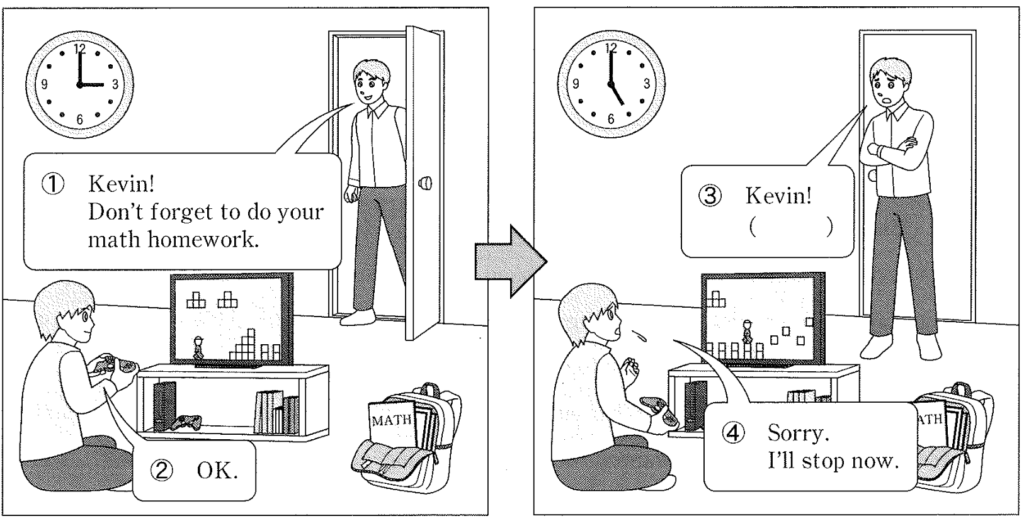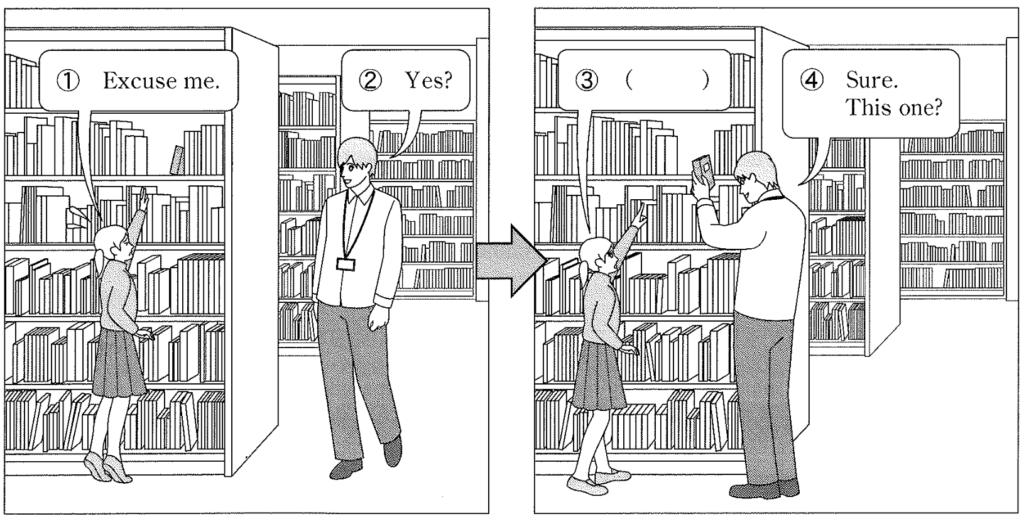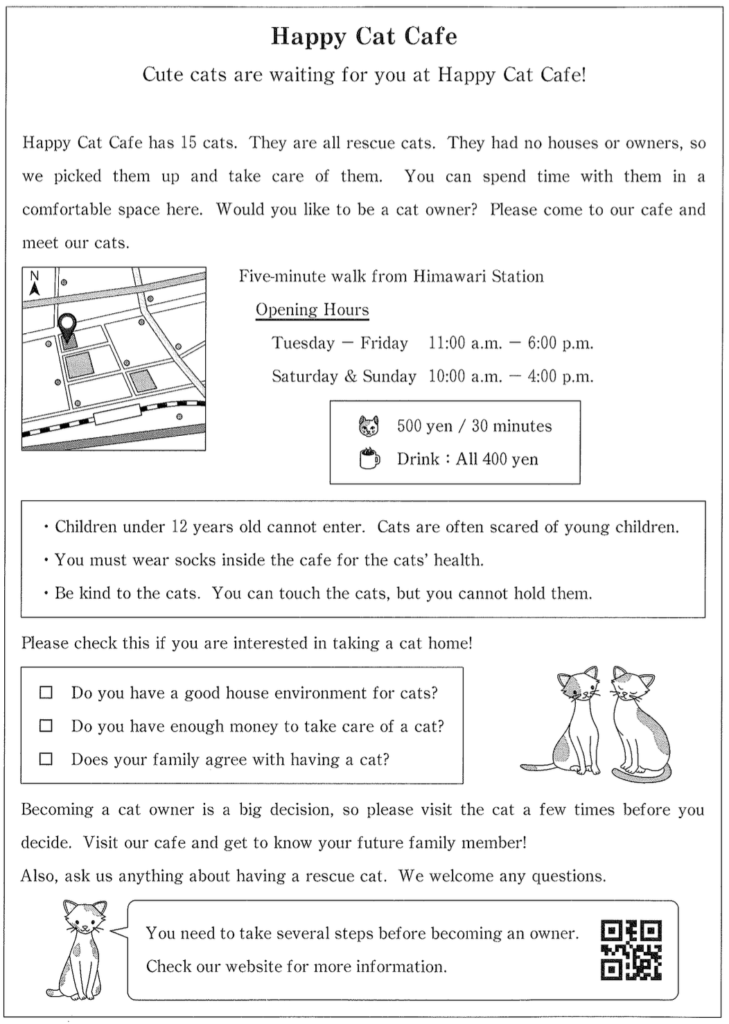最後に、傾向と対策・高校入試のしくみなどへのLINKがあります。
(大問1〜4はリスニング試験です。後日アップします。)
5
次の(1)~(5)の対話文を完成させなさい。
(1)、(2)については、それぞれの( )の中の語を最も適当な形にしなさい。ただし、英単語1語で答えること。また、(3)〜(5)については、それぞれの( )の中のア〜オを正しい語順に並べかえ、その順序を符号で示しなさい。
(1)
A: Look at (that) people in the park. What are they doing?
B: I think they are practicing dancing for the festival.
正解:●●●
Short 解説はこちら
2)
A: Do you want to try wearing a Kimono?
B: Yes! I have never (wear) one before.
正解:●●●
(3)
A: How many books do you read each month?
B: Only one or two. I (ア had イ I ウ time エ more オ wish) to read.
正解:●●●
(4)
A: I think (ア sports イ soccer ウ team エ are オ such as)good for children.
B: I agree, but I think other kinds of sports are also good for them.
正解:●●●
(5)
A: It’s hot in this room. Can I turn on the air conditioner?
B: Sure. You should close (ア keep イ the door ウ the room エ cool オ to)
正解:●●●
6
次の( 1 ),( 2 )のイラストについて、( )に入る適当な言葉をそれぞれ英語で書きなさい。ただし 、語数はそれぞれ10語程度(・・?!などの符号は語数に含まない。)とし、2文以内で書きなさい。なお、会話は①~④の順に行われてい ます。
( 1 )ケビン(Kevin)と父親の会話です。

正解例:●●●
( 2 )図書館での会話です。

正解例:●●●
7
次の(1)(2の英文を読んで、それぞれの問いに答えなさい。
(1)ユカ(Yuka)たちのグループは、英語の授業で、自分たちが考えた理想のアプリ(our ideal app)について、スライドを使いながら発表をしています。
< Yuka >
If you could create an app, what would it be like? We designed our ideal app which can make people happy. First, Kent will tell you how we designed the app, then, Maki and I wil talk about what it does.
< Kent >
First, we asked our family, friends and teachers what kind of apps they wanted. We got a lot of interesting ideas. We found that about 30% of them wanted apps for housework like cooking and cleaning, 20% wanted apps for health, 15% wanted apps that
help them save energy, water, or food, and 10% wanted apps for studying.Second, we talked about what our app would be for. Maki and I thought it should befor family life, and Yuka wanted to make something good for the environment. So, we decided to design an app which can improve both family life and the environment.
< Maki >
I will explain what we can do with our app. It’s called “What’s for Dinner?” It recommends the best dinner for a family. By connecting our app with your refrigerator and each family member’s smartphone, it can check the food in the refrigerator and each family member’s health, and then it wil decide the best menu for dinner and choose a recipe to use. If you send photos of your lunch to our app, it wil give you a different menu for dinner. You can enjoy a good dinner with your family by using this app.
< Yuka >
Our app is good for the environment, too. It helps you save electricity. Also, it can help you reduce food waste. We believe our app can make you happier because you can enjoy a good dinner and protect the environment. We hope that someone will make this idea a reality in the near future. Thank you for listening. Do you have any questions?
( 注 ) housework 家事 recipe 調理法 electricity 電力 foodwaste 食品廃棄
①ユカたちのグループは、発表で次のア~エのスライドを使いました。これらのスライドを発表で使用した順に並べかえ、その順序を符号で示しなさい。

正解:●●●
② 本文の内容に関する次の質問の答えとして適当でないものを、あとのア~エのうちから一つ選び、その符号を答えなさい。
What does thier app do?
ア It collects information about family members.
イ It gives advice about health to each family member.
ウ It shows how to cook the dishes it recommends.
エ It helps to reduce the amount of food thrown away.
正解:●●●
③ 発表を聞いたフレッド(Fred)がユカに質問をしています。次の会話中の( )に入る最も適当な英単語1語を書きなさい。
Fred:Your presentation was interesting, but I have a question, Yuka. You said that you can save electricity by using the app.How?
Yuka:Thank you, Fred. That’s a good question. Our app can tell you what is in your refrigerator. You don’t have to ( ) it to check, so the cold air won’t go out and you can save electricity.
Fred: Oh, I see. Thank you.
正解:●●●
④ 本文の内容に合っている英文として最も適当なものを、次のア~エのうちから一つ選び、その符号を答えなさい。
ア They did research before they started to design their app.
イ They designed an app to improve their school environment.
ウ The app they designed sends you photos of the food in your refrigerator.
エ The app they designed checks how much electricity is saved.
正解:●●●
(2) 次は、あるカフェの広告です。

( 注 )rescue cats 保護ねこ owners 飼い主 get to ~するようになる
① 広告の内容に合うように、次の英文の( )に入る最も適当なものを、あとのア~エのうちから一つ選び、その符号を答えなさい。
You cannot enter this cafe( ) .
ア if you don’t want to become an owner of a cat
イ if you haven’t checked their website
ウ if your child is 14 years old
エ if you don’t wear socks
正解:●●●
② 広告を見て、ニコ(Nico)とエミ(Emi)が話をしています。次の会話中の( )に入る最も適当なものを、あとのア~エのうちから一つ選び、その待号を答えなさい。
Nico: I visited this cafe with my parents last week.
Emi: Oh, how was it?
Nico: All the cats were really cute, and I found my favorite one.
Emi: Did you take it home?
Nico: No. The cafe recommends that we should ( ), so we’re going to visit the cafe again. We need to take several steps before becoming an owner.
Emi: I see.
ア pay enough money for the cat
イ learn how they picked up rescue cats
ウ get to know the cat better
エ make friends with other cat owners
正解:●●●
③ 広告の内容に合っている英文として最も適当なものを、次のア~エのうちから一つ選び、その符号を答えなさい。
ア Small children cannot enter this cafe because they are afraid of cats.
イ This cafe is open for longer hours on weekends than on the other days.
ウ This cafe has fifteen rescue cats and they al live outside.
エ I Customers must not hold the cats but they can touch them
正解:●●●
8
次のサトミ(Satomi)のスピーチを読んで、あとの(1)~(5)の問いに答えなさい。
Albert Einstein once wrote, “Life is like riding a bicycle. To keep your balance, you must keep moving.” I am often encouraged by his words when I have a problem. I always try to keep moving forward. However, one time, ( A ).
Last summer, I visited New Zealand and stayed with a host family for three weeks. At first, I wasn’t worried about staying there because I liked studying English and I believed I was good at it. But I could not communicate well with people there. I was shocked and felt very sad. I lost my energy and I didn’t want to do anything. I felt I couldn’t achieve anything in my life.
A week after I arrived, my host grandmother, Karen, talked to me with a smile. She said,”Satomi, do you have ikigai?” I was surprised to hear a Japanese word from her. I asked her why she knew the word. She said, “A few years ago, when I became sick and very depressed,one of my friends told me about the idea of ikigai. Then I learned more about it from some books. It helped me a lot to move forward.” She also said, “Why don’t you ask other people about their ikigai? You can ask, What is your purpose in life?’ or ‘What do you love to do?’ or ‘( B ) ‘ I know you can do it.”
During my stay, I asked many people these questions. People looked happy when they were talking about their ikigai, and I felt happy, too. At the same time, I found my English was improving. I thought that communicating with people and looking at people’s happy smiles could be one of my ikigai. I found that my ikigai is related to other people’s happiness, too.
After I came back to Japan, I read more about ikigai on the Internet. People around the world are getting to know the word because of some research that was done. Some researchers believe that having an ikigai makes life more exciting. They also believe people who have one are healthier and live longer.
According to a dictionary, the word ikigai means “something that makes you happy to be alive.” However, in my opinion, the word has more meanings and it is difficult to explain in other words. So the Japanese word ikigai is used in other languages, too. For me, ikigai is something that helps me keep moving forward. Life is like riding a bicycle, so let’s find our own
ikigai and keep moving forward.
( 注 ) Albert Einstein アルベルト・アインシュタイン host family ホストファミリー achieve ~を達成する
balance バランス ikigai 生きがい purpose 目的 alive 生きている
1)本文中の(A)に入る最も適当なものを、次のア~エのうちから一つ選び、その符号を答えなさい。
ア I suddenly forgot how to keep moving
イ someone taught me how to ride a bicycle
ウ someone broke my favorite bicycle
エ I didn’t have any problems
正解:●●●
(2)本文中の(B)に入る英文として適当でないものを、次のア~エのうちから一つ選び、その符号を答えなさい。
ア What are you good at?
イ What do you enjoy doing?
ウ What can society do for you?
エ What can you do for others?
正解:●●●
(3)サトミのスピーチを聞いたハル(Haru)とビリー(Bilic)が話をしています。次の会話中の( )に入る適当な言葉を英語で書き、英文を完成させなさい。ただし、語数は6~10語(,などの符号は語数に含まない。)とすること。
Haru: I thought ikigai was just something that a person likes doing, but Satomi’s speech changed my idea of ikigai.
Billie: How was it changed?
Haru: From Satomi’s speech, I learned that ikigai is also something that ( ) .Billie: I understand. We feel happy when we make other people happy. I think we all want to feel useful.
解答例:●●●
(4)本文の内容に合うように、次の英文の( )に入る最も適当なものを、あとのア~エのうちから一つ選び、その符号を答えなさい。
Satomi thinks that the Japanese word ikigai is used around the world because ( ) .
ア everyone likes to hear the word
イ some researchers spread the word
ウ many people are studying Japanese
エ the word is difficult to translate
解答:●●●
(5)本文の内容に合っている英文として最も適当なものを、次のア~エのうちから一つ選び,その符号を答えなさい。
ア Satomi felt sad because people didn’t like to communicate with her.
イ Karen wanted to encourage Satomi by talking in Japanese.
ウ Satomi read some articles about ikigai while she was in New Zealand.
エ Some researchers think ikigai helps people to live longer.
正解:●●●
9
中学生のナミ(Nami)が料理人のジョン(John)にインタビューをしています。この対話文を読んで( )に入る最も適当なものを、それぞれるとのア~エのうちから一選び、その符号を答えなさい。
Nami: Today, I’d like to interview you for my presentation.
John: OK, Nami. Please ask me anything.
Nami: Thank you. First, why did you come to Japan? Did you come to Japan ( 1 ) ?
John: No, not at all. I first came to Japan fifteen years ago as an exchange student. While I was studying at a university in Tokyo, I fell in love with Japanese cuisine. After the first year of my exchange program, I left the university and entered a Japanese cooking school.
Nami: That’s interesting. When did you open your own restaurant?
John: About two years ago.
Nami: You mean | ( 2 ) ?
John: Well, I had to learn many things, so it took a long time. After I graduated from the cooking school, I started working at a restaurant and I learned more. I needed to learn Japanese language and culture, too.
Nami: I see. | ( 3 )
John: I wanted to keep living here and learning more about Japan.
Nami: Lastly, ( 4 )
John: Yes. I would like to open a second restaurant in my country in 10 years.
Nami: Wow! That would be great.
( 注 ) exchange student 交換留学生 Japanese cuisine 日本料理
(1)
ア to study in Tokyo
イ as an exchange student
ウ fifteen years ago
エ to become a chef
正解:●●●
(2)
ア you didn’t want to go back to your country
イ it took more than ten years to become a chef
ウ you had to study Japanese culture
エ I there were not any chefs who came from other countries
正解:●●●
(3)
ア Why did you open a restaurant in Japan, not in your country?
イ What did you want to learn in Japan?
ウ What was the hardest thing when you opened your restaurant?
エ I Why did you decide to learn more at a restaurant?
正解:●●●
(4)
ア do you have any dreams now
イ would you like to live in another country
ウ is your restaurant open today
エ I have you opened another restaurant
正解:●●●
千葉県教育委員会のホームページより、最新の情報が得られます。必要に応じて、見るようにしましょう!






